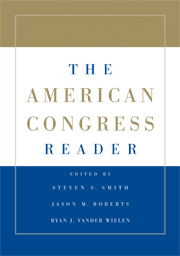Book contents
- Frontmatter
- Contents
- THE AMERICAN CONGRESS READER
- PART I THE AMERICAN CONGRESS: MODERN TRENDS
- PART II REPRESENTATION AND LAWMAKING IN CONGRESS: THE CONSTITUTIONAL AND HISTORICAL CONTEXT
- PART III CONGRESSIONAL ELECTIONS AND POLICY ALIGNMENTS
- PART IV MEMBERS, GOALS, RESOURCES, AND STRATEGIES
- PART V PARTIES AND LEADERS
- PART VI THE STANDING COMMITTEES
- 17 Distributive and Partisan Issues in Agriculture Policy in the 104th House
- 18 Principals, Goals, Dimensionality, and Congressional Committees
- 19 Nonlegislative Hearings and Policy Change in Congress
- PART VII THE RULES OF THE LEGISLATIVE GAME
- PART VIII THE FLOOR AND VOTING
- PART IX CONGRESS AND THE PRESIDENT
- PART X CONGRESS AND THE COURTS
- PART XI CONGRESS, LOBBYISTS, AND INTEREST GROUPS
- PART XII CONGRESS AND BUDGET POLITICS
- PART XIII FURTHER READINGS ON CONGRESSIONAL POLITICS
17 - Distributive and Partisan Issues in Agriculture Policy in the 104th House
Published online by Cambridge University Press: 05 June 2012
- Frontmatter
- Contents
- THE AMERICAN CONGRESS READER
- PART I THE AMERICAN CONGRESS: MODERN TRENDS
- PART II REPRESENTATION AND LAWMAKING IN CONGRESS: THE CONSTITUTIONAL AND HISTORICAL CONTEXT
- PART III CONGRESSIONAL ELECTIONS AND POLICY ALIGNMENTS
- PART IV MEMBERS, GOALS, RESOURCES, AND STRATEGIES
- PART V PARTIES AND LEADERS
- PART VI THE STANDING COMMITTEES
- 17 Distributive and Partisan Issues in Agriculture Policy in the 104th House
- 18 Principals, Goals, Dimensionality, and Congressional Committees
- 19 Nonlegislative Hearings and Policy Change in Congress
- PART VII THE RULES OF THE LEGISLATIVE GAME
- PART VIII THE FLOOR AND VOTING
- PART IX CONGRESS AND THE PRESIDENT
- PART X CONGRESS AND THE COURTS
- PART XI CONGRESS, LOBBYISTS, AND INTEREST GROUPS
- PART XII CONGRESS AND BUDGET POLITICS
- PART XIII FURTHER READINGS ON CONGRESSIONAL POLITICS
Summary
The authors test the competing theories of legislative organization – distributive, informational, and partisan – by examining the decisions and policies of the House Agriculture Committee. They argue that under certain conditions each of the theories offers some insight into committee behavior. Specifically, they find that the committee's policy space is multidimensional and that there are instances of both partisan and distributive considerations. Moreover, there are circumstances in which the committee acts in accordance with chamber preferences as well as instances in which high demanders on the committee take policy stances that are inconsistent with the floor.
There has been substantial debate among students of Congress concerning the theoretical and empirical applicability of various theories of legislative behavior and organization. Some scholars contend that one perspective is a sufficient explanation of legislative organization and decision making, but others argue that various theories apply at varying times and under differing circumstances. “Rather than seek a single, universal account of congressional politics – whether distributive, informational, partisan, or anything else – we should recognize that all of these considerations operate in varying degrees and that the variation is systematic and predictable.” This study is an effort to extend and apply the latter view.
We want to assist in the effort to see that these varying legislative theories are “knitted together.” To that end, we analyze agriculture policymaking in the 104th House. The House Agriculture Committee is considered a classic constituency committee.
- Type
- Chapter
- Information
- The American Congress Reader , pp. 213 - 220Publisher: Cambridge University PressPrint publication year: 2008
- 1
- Cited by



